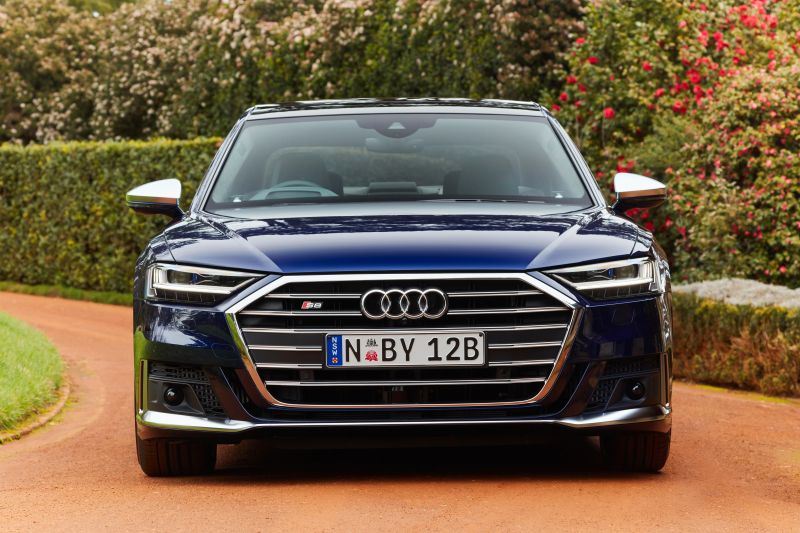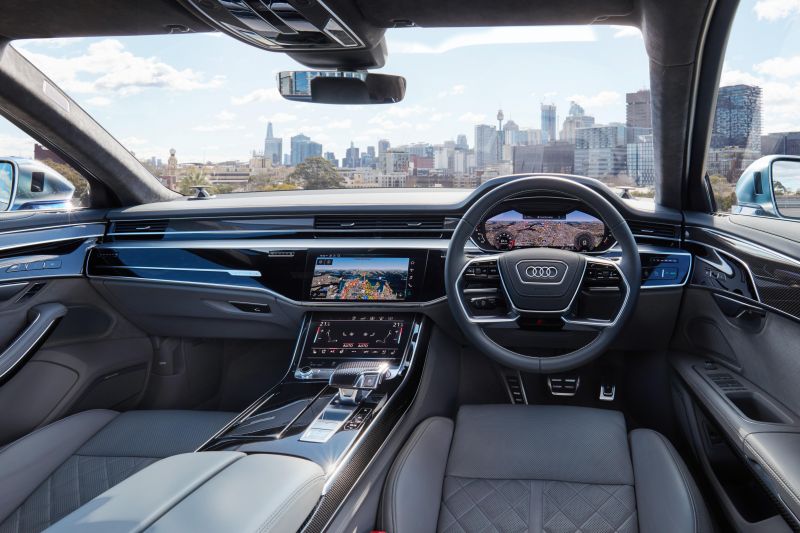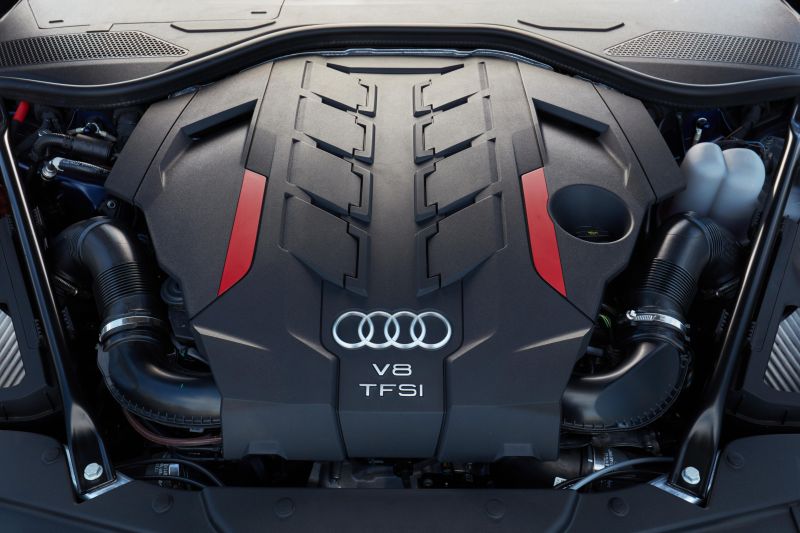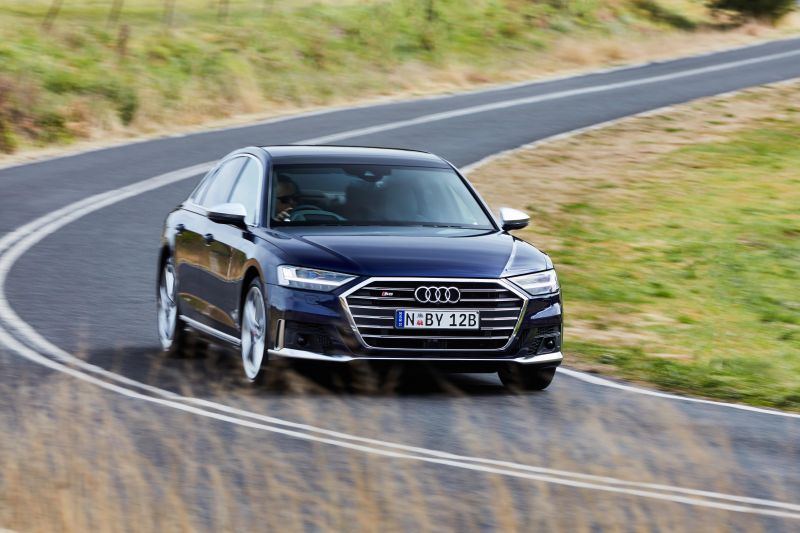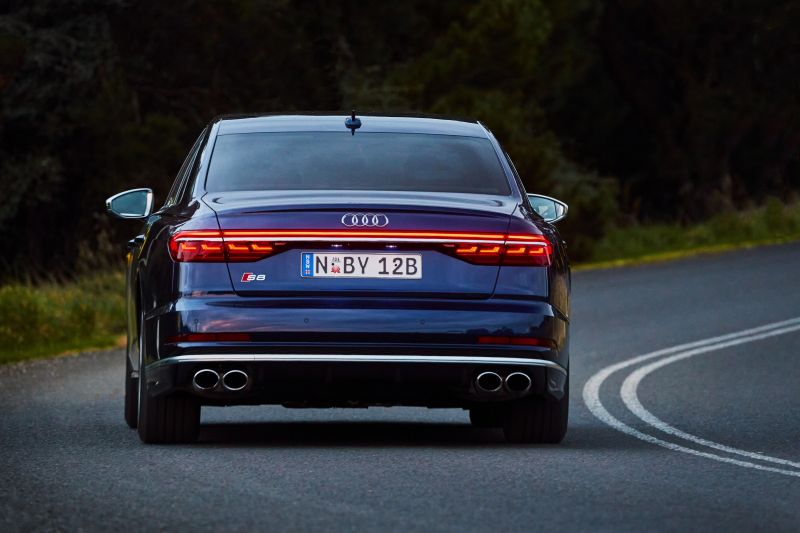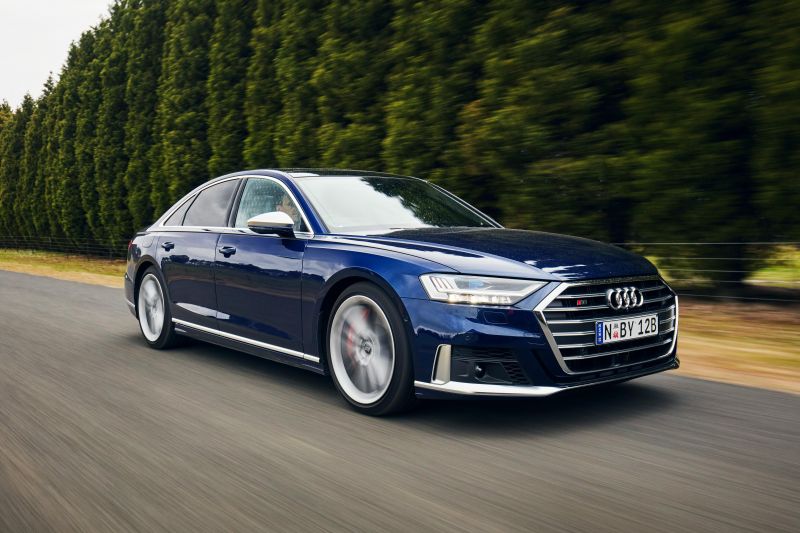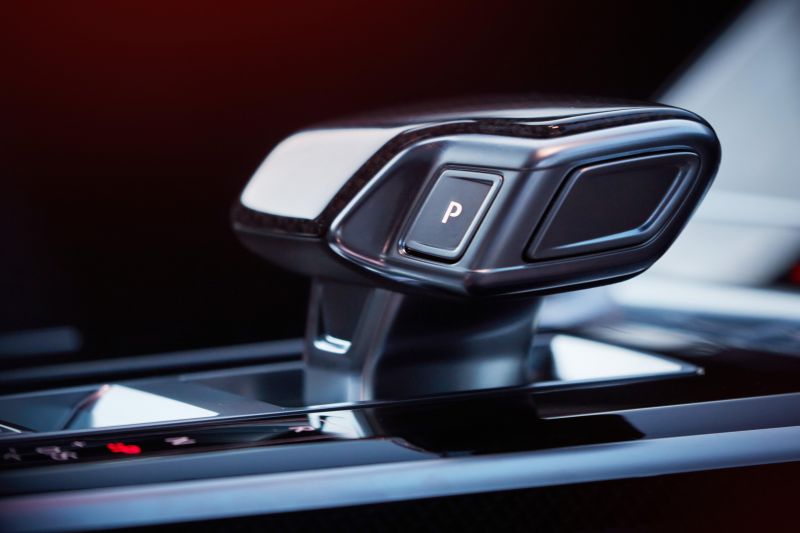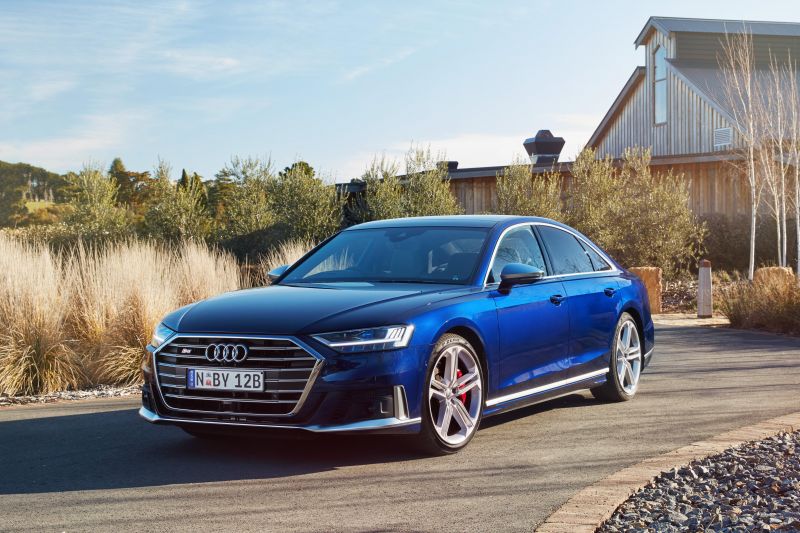The most disappointing thing about the Audi S8 is that Australia is undeserving of something this good.
Our roads – and more poignantly, our speed limits – simply do not allow a driver to experience this car’s potential and credentials.
So, this thing? It’s exceptional. Ridiculously luscious and luxurious, alarmingly powerful and frightfully expensive.
I don’t know why you’d buy it, but I totally understand why you’d want to considering there isn’t likely to be another petrol S8 model like this, thanks to the inevitable push towards EVs.
So, if you can, should you? Let’s find out.
How much does the Audi S8 cost?
The asking price is $273,400 before on-road costs. Let that sink in.
It’s not as expensive as a V8-powered Mercedes-Benz S-Class – the S 580L version of that limousine is an eye-watering $332,760. And there is no V8-powered 7 Series from BMW offered in Australia anymore – even so, a turbo-six 740i is $272,900.
So, while it is expensive, it’s not that expensive compared to its rivals. In fact, the next closest thing to this is a Porsche Panamera GTS, which also has a 4.0-litre twin-turbo V8 funnily enough, but it costs $317,900. If it were my cool three-hundred grand, I’d be sooner spending it on an Audi RS6 Avant ($232,200), which is quicker, more practical and more raucous to drive. Rumour has it, that’s why it has an R in its name.
You’ll find out below what you get for your hard-earned, but just know that the standard range of paint options no-cost – so, Brilliant Black Solid, the metallic choices of Mythos Black, Firmament Blue (pictured), Ultra Blue, District Green, Vesuvius Grey, Florett Silver, Glacier White and also Daytona Grey pearl are $0 options. There’s also a broader range of Audi Exclusive Exterior paint finishes for $7500.
This particular test vehicle was also fitted with the Sensory Package, a $19,000 option that comprises full leather trim with contrast stitching, Bang & Olufsen surround sound system, heated rear seats, cooled rear seats, massaging rear seats, and electric rear seat adjustment with lumbar support.
Price as tested? $292,400 plus on-road costs – eep!
What is the Audi S8 like on the inside?
Before you even get into the car, it rises up to greet you – with the air suspension increasing the height of the car by up to 50mm to make ingress and egress a touch easier.
However, this car has exceptionally large door sills, and both myself and my partner tripped over them at least once while stepping in. Once in, you can close the door (which has soft shut functionality) and settle into the luxurious space on offer.
The cabin design could best be summed up as opulent without being ostentatious, though some may find the carbon trim a bit over the top for their tastes.
However, it is an S model, so it should have sporty bits in equal measure to luxury stuff, and it plays both parts of that argument quite well.
It’s not as blingy as a S-Class inside, but I actually think that plays to its advantage, because there are some understated but excellent inclusions on the technology front, including a high-resolution 10.1-inch colour display up top, which covers smartphone mirroring (wireless Apple CarPlay and Android Auto), sat nav and media controls (including a digital TV for when you’re sitting around waiting for passengers), and there’s a lower 8.6-inch touch screen with climate buttons and other controls, and it has a lovely haptic feedback – so long as you hit the button you intend to, which can be hard when you’re driving.
The seats are exceptionally comfortable, and the massage function – with multiple different modes, including things like Waves, Circles, Revitalise and Stretch – makes long distance driving a breeze. Trust me, I did a trip from Sydney’s west to Orange and back in a day with this car, and got out feeling physically fine.
I’ve come to really appreciate the ambient lighting within the cabin, and it’s delightful in the way that it illuminates the colour that you adjust the temperature (blue for colder, red for warmer). The lights at the edges of the dashboard and onto the doors will also flash red if there is something in your blind spot, or if the car is trying to prevent you from exiting into the path of oncoming traffic.
Further, there is matrix lighting technology on offer in the cabin as well, and it really does make for a very easy car to extract a small child from at night, as I did a few times during my week with it.
And another feature that I wasn’t sure about at first but came to appreciate over the week was the door handles, which feature a simple light-touch action to open the door, so you don’t have to reef the handle. Very civilised.
The materials are of an extremely high quality, and the touch points are all beautifully finished. There is an excellent level of attention to detail, and nothing really looks or feels out of place. However, I do find it to be an interesting quirk of the A8 and S8 family is that the driver-side front door has a different design to the passenger side, without as useful a grab handle. That is because it has more controls on offer, but it is just a little bit weird.
Speaking of controls, I like that there is a volume dial, and the carbon inlay on the gear selector is beautiful to behold.
I also really appreciated that on one of the very cold days that I drove this car, the central armrests feature heating – something that I never knew that I needed, but it is a really welcome addition.
As for storage in the front, there is a split lid covered centre console bin with a wireless phone charger cradle (great for keeping your phone out of sight and out of mind – when it works, which it did intermittently fail to do with my iPhone 14 Pro), while near the gear selector is a pair of cupholders. The doors have large bottle caddies, and there are small covered storage bins in the armrests of the front doors as well, but it certainly isn’t setting any standards when it comes to storage.
Well, despite the fact this is a very large vehicle, it isn’t the roomiest car in the world for taller rear seat occupants. At 182 cm or 6’0”, I had enough space to sit behind my own driving position, but some much smaller vehicles these days have considerably more space on offer. And that was with the rear seat set in the ‘sitting’ position – if I hit the recline button, I ended up with my knees hard against the seat ahead, or splayed either side of it.
The obvious solution, of course, is to hire a small statured driver. Not a problem that I will ever have in my life!.
There are three seats in the back, although it is definitely designed as a four-seat vehicle. The outer seats with their adjustability are very much sculpted to suit individual occupants, and anyone sitting in the middle will be uncomfortable. There’s a massive transmission tunnel intrusion as well.
The centre console area does fold down to reveal additional seat adjustments and a touchscreen for some of the car’s comfort controls (lighting, media, climate, shades etc). There’s also a pair of USB-C ports in there, and if you need it, the middle section can also push down to accommodate load-through access to the boot.
In the backseat, you also get – strangely – a pair of 12-volt outlets in a flip-down section in the centre console zone, and they look very much like they’re designed to harness cigarette lighters. There is quad-zone climate control as well, with directional air vents between the front seats, and in the B pillars.
There are storage pockets on the backs of both seats, and bottle holders in the doors, as well as a pair of pop out cup holders in that centre console fold down section (which is beautifully damped when opening and closing, by the way).
And if you have (very lucky) kids, they will appreciate that there are ISOFIX points in the window seats and three top-tethers as well.
Now, boot space is good for a sedan, with 505 litres of cargo space for the sneaky weekend away. There is a hump towards the front of the cargo area, which does eat into the space a little bit, and in the S8 you miss out on a spare wheel – just a repair kit, here.
What’s under the bonnet?
A heavenly symphony of combustion.
That’s one way to describe the 4.0-litre bi-turbo V8 petrol engine under the bonnet of the S8, which produces 420kW (6000rpm) and 800Nm (2050-4500rpm). That’s enough to propel it from 0-100km/h in a claimed 3.8 seconds – nearly as fast as the bonkers Audi RS6 Avant, which claims 3.6 seconds.
It also incorporates a 48-volt mild-hybrid system, which can shut down the engine when coasting; as well as a cylinder on-demand function that can cut it back to four cylinders under light loads.
It has an eight-speed automatic transmission with paddle shifters, and of course quattro all-wheel drive which, in normal driving, splits 40:60 front:rear, but can send up to 85 per cent of engine torque to the rear.
When it comes to fuel consumption, the official combined cycle figure is 10.5 litres per 100 kilometres, and over an extensive test drive (more than 500km) I saw a real-world return of 12.2L/100km, which I was fine with considering the performance potential of this car.
In the words of Snake from The Simpsons, “she needs premium, dude!” – 95 RON minimum, thank you, but as if you’d put anything other than 98 RON in a car like this (it is confusing, as both standards are listed on the inside of the filler cap). Fuel tank capacity is 82 litres.
How does the Audi S8 drive?
As I said at the start, this car is arguably too much for Aussie roads.
Autobahn luxo-barges like this are made for powering down the highway at speeds that could see you locked up for a decade in Australia – in a lot of ways, it seems a waste to buy something like this.
But that’s a dumb argument, because if you want nice things that are fast, fun, make you feel good and you can afford them, good for you – consume, my pretties!
Anyway, it’s a dreamy drive. There’s mammoth levels of grunt from this powertrain, which is employed in a number of other Audi (and VW Group) models, and it really is a fantastic thing, when you’re driving it how it wants to be driven.
There’s a subdued warble that gives way to a more enticing in-gear wail as you accelerate, and it really does find the horizon faster than you’d think. This car gathers pace so effortlessly it will make you wish you had the old-fashioned speed alert system like my parents had in their VR Commodore.
I mean, there is a system like that if you’re really worried, and you can set the speed limiter so you won’t lose your licence if you get caught letting this thing get the better of your sensibilities; but it really is supremely fast, and it never feels like you’re going as quick as you are.
The eight-speed automatic is smooth and shifts smartly, though I did find that in light-throttle situations that the powertrain could be a little lazy to re-engage, thanks to the 48-volt mild-hybrid system making the car coast whenever possible to help save fuel. You can just leave it in Dynamic mode if that’s not your bag.
The predictive adaptive air-suspension, which uses a camera system to ‘read’ the road ahead and adjust the suspension to offer the best ride comfort and control possible, is a fantastic bit of tech. You can feel the front end rise up and ready itself for a speed bump, and the rear juts up and aligns as you crest the rise. It’s a strange sensation, as though the car is hovercrafting its way over obstacles.
But it’s also very effective when it works. It’s best at dealing with raised elements in the road ahead, but doesn’t do so well when it comes to adjusting for deep divots or ruts. Even so, the ride in those situations is still very good for a car that’s this big, this heavy (2295kg incl. 75kg driver), and is riding on 21-inch wheels with licorice-like 35-profile tyres.
One thing that is seemingly at odds with the sheer size (5190mm long, 2998mm wheelbase) is the four-wheel steering system, which makes it feel unnaturally agile in tighter corners.
It almost feels like the car pivots way sooner than you think it should, and it’s not the ‘purest’ of driving experiences.
However, that four-wheel steering system does enable it to turn in a tighter radius at lower speeds, meaning you can complete U-turns and parking moves in far less space than you’d think, for a car this large.
What do you get?
S8 highlights:
- Matrix LED headlights
- Night vision assist with marking lights
- OLED tail lights
- 21-inch alloy wheels
- Rear privacy glass
- Red brake calipers
- Configurable dual exhaust
- Predictive Active Suspension
- Air suspension
- Dynamic all-wheel steering
- Semi-automatic parking assist
- Wireless Apple CarPlay, Android Auto
- 12.3-inch Virtual Cockpit Plus cluster
- Head-up display
- 10.1-inch + 8.6-inch touchscreens
- Dual 10.1-inch rear displays
- Digital TV
- Heated, leather-wrapped steering wheel
- 23-speaker 1920W Bang & Olufsen 3D sound system
- Valcona leather upholstery
- Heated, ventilated, massaging front seats
- Colour-adjustable ambient lighting
- Carbon vector and dark brushed aluminium inlays
- Stainless steel pedals
- Extended leather upholstery package
- Matrix LED rear reading lights
- Power outboard rear seats
- Heated rear seats
- Memory function
- Power sunblinds
- Electric sunroof
- Rain-sensing wipers
Is the Audi S8 safe?
Just like the A8, there’s no official crash test safety rating for the Audi S8.
But it has an extensive list of safety technology fitted:
- Autonomous emergency braking
- Low, high speeds (up to 250km/h)
- Pedestrian detection
- Cyclist detection
- Intersection assist
- Blind-spot monitoring
- Lane keep assist
- Safe exit warning
- Rear cross-traffic assist
- Surround-view cameras
- Surround parking sensors
- Adaptive cruise control with stop/go
- Traffic jam assist
- Steering, accelerating and braking in traffic jams
- Emergency assist
- Can monitor and react to an unresponsive driver
- Night vision assistant
- Can detect humans, large animals
It also has dual front, front side, rear side, full-length curtain and front-centre airbags.
How much does the Audi S8 cost to run?
There’s a five-year, unlimited kilometre warranty plan.
Audi will cover maintenance for five years or 75,000km if you pay for a five-year service plan, which is $4520. Intervals are 12 months or 15,000km – whichever comes first.
If you maintain your car with Audi’s dealer network, you will also receive annual top-ups for roadside assistance.
CarExpert’s Take on the Audi S8
I think I’ve made it clear that this is an exceptionally good luxurious fast machine.
It’s plush, powerful and potent, and while it may not absolutely nail the “limousine” part of the brief in terms of outright rear-seat space, it really is a great car… and likely the last of its kind.
Click the images for the full gallery
MORE: Everything Audi S8

